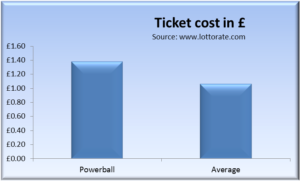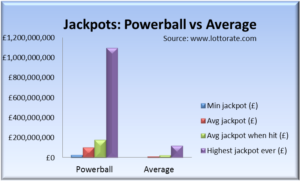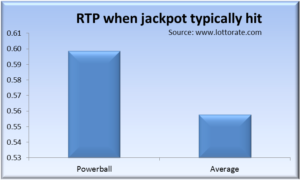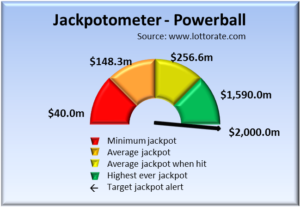
Powerball
Name
Operator
Type
Country
Website
Founded
Lottorating
Powerball
Offered by individual US state operators
Multi-state lottery
US
powerball.com
1992
31/50
Introduction
Overview
Powerball is the big daddy of lotteries. Whilst it's not the oldest, it has the most superlatives in other respects, whether biggest average jackpot, first prize in the world to exceed $1bn and so forth.
.
Where Available
It is available across 47 localities in the US and many concierge or betting services also offer the chance for others to play internationally.
How it Works
Date and time of draws
2 draws on a Wednesday and a Saturday at 11pm ET.
No. of balls and how to hit the jackpot
There are 69 main balls to choose from and 26 in the bonus ball pot. You 'only' need to hit 5 main balls and 1 bonus ball to hit the jackpot. The odds of doing so are a massive 292m to 1, making it the second most unlikely jackpot to hit (after the Italian 622m to 1 longshot).
Other Variations
Like Megamillions, Powerball also has a variation on the main game called Powerplay. For an extra $1 (so $3 in total), players get better returns on all prizes except the main jackpot. The match 5+0 (second tier prize) becomes a fixed cash payment of $2m rather than $1m whilst other payouts are determined by a multiplier which varies between 2x and 10x. (it will be slightly less for jackpots over $150m as the 10x multiplier is then no longer an option). Based on jackpots over $150m the average multiplier is 2.6x. Powerplay is a nice way of spreading the joy a little bit further down from the main jackpot win to the lower tiers. Around 11% of people play with the Powerplay option each week. Whether you should play or not really depends on whether you are in it for the big one only... or not! Powerplay's value also depends on the size of the jackpot advertised that week. The net effect in terms of return to player (RTP) is very similar to the Megaplier on Megamillions in that the RTP is better when jackpots are smaller (0.32 to 0.44 vs 0.23 and 0.41) but not so good when jackpot sizes increase. See RTP below. Note that California do not apply the Powerplay in the same way as other states - see their site.
Price, Tickets & Sales
Ticket Price
 At $2 or double the price of Megamillions, Powerball isn't the cheapest option out there. It's still lower though than some of the bigger European lotteries. The Powerplay version of the game costs an extra $1, so $3 in total (see variations above)
At $2 or double the price of Megamillions, Powerball isn't the cheapest option out there. It's still lower though than some of the bigger European lotteries. The Powerplay version of the game costs an extra $1, so $3 in total (see variations above)
Tickets Sold Per Draw
The difference between average numbers of tickets sold and the number sold when the jackpot grows is at its most extreme with the Powerball. Whereas you might typically see around 25,000 tickets sold per draw, when the jackpot hit 1.5bn, 600m tickets were sold on one draw. The good news is that this is a lively and exciting lottery to play; the bad news is that at that level you're very unlikely to hit the jackpot on your own!
Sales per draw
As it costs a bit more than many lotteries it is no. 2 in terms of average sales volume after the Euromillions.
Odds
Prize Table
Odds of hitting the jackpot
The prize table for Powerball is as follows:…
The odds of hitting the jackpot have increased over the years from 1 in 52m to today's massive 1 in 292m, the longest odds of any lottery other than the Italian Superenalotto. The change in 2015 from 1 in 175m to 1 in 292m is one key reason why the jackpot managed to reach the heady levels of $1.5bn. Higher jackpots also mean more press coverage (though it does get harder each year to impress!) which in turn lead to more sales. The latest $1.5bn jackpot story did at least halt what was a slight decline in Powerball sales....
Balls and Bonus Balls
Prize
Odds
5 and 1
5 and 0
4 and 1
4 and 0
3 and 1
3 and 0
2 and 1
1 and 1
1 and 0
256,000,000*
1,000,000
50,000
100
100
7
7
4
4
292,201,338
11,688,053
913,129
36,525
14,494
580
701
92
38
*Average jackpot size when it is hit
Odds of winning any prize
There's a 1 in 25 (ok, 1 in 24.732 for the geeks out there...) chance of winning any prize on the Powerball. At first glance this doesn't seem as generous as the Megamillions until you realise that you're at least getting twice your stake back, $4, on the lowest prize tier. Because the minimum payout is $4, the chance of winning more than your stake on the Powerball is the same as the frequency of any win: 1 in 25.
Jackpots
Minimum jackpot
Powerball is the most generous of all lotteries in terms of the minimum size of jackpot that it guarantees. Even after a jackpot win, the next draw will offer a jackpot of at least $40m, a figure which dwarves the size of jackpots of many other lotteries, even after they've grown through rollovers.
Average jackpot
If you think $40m is good, then in a typical week, you'd expect the Powerball jackpot to be around $150m! If you happen to play on subscription and let it play for weeks, you'll not be disappointed at your jackpot size when(if) it comes in.
Average jackpot when hit
 And what of the average jackpot that players really hit? It's a massive $250m! With recent history of the $1.5bn causing such a stir, it's getting harder to generate jackpot fever with anything lower than a $400m jackpot. Of course sales increase in line with the jackpot after it hits $100m or so but the extra 'fever effect' let's call it, whereby, people start chasing is taking a bit longer to start.
And what of the average jackpot that players really hit? It's a massive $250m! With recent history of the $1.5bn causing such a stir, it's getting harder to generate jackpot fever with anything lower than a $400m jackpot. Of course sales increase in line with the jackpot after it hits $100m or so but the extra 'fever effect' let's call it, whereby, people start chasing is taking a bit longer to start.
Highest jackpot ever
I think the Powerball's record of largest jackpot will last for a while yet and only the Megamillions jackpot structure has a chance of beating it. In January 2016 the jackpot hit $1.5bn and was won by three tickets in the US. Powerball also holds the record for a one ticket win with the highest global jackpot of $590.5m won by one individual in 2013.
Jackpot winners per year
Despite longer odds of hitting the jackpot, healthy sales mean that you can expect to see more winners of the Powerball jackpot each year (around 9/yr) than of the Megamillions equivalent (7 per year approx.).
Contribution to the jackpot
As a % of prizes paid out when it's hit, the jackpot will generally be a smaller % of total payout than it is on Megamillions. But this is just one of those averages that aren't particularly significant. Around 37% of sales are fed into the jackpot pool each draw - fairly similar to many other lotteries.
Return to Player
Introduction
The return to player % per dollar spent on tickets isn't bad on Powerball, but then again, it's not the best either…
RTP when first seeded
If you play when the jackpot has first been (generously reseeded) your 'value' on a dollar is around 23c.

Average RTP
If you're a subscription player your average RTP is worth around 41c.
RTP when jackpot typically hit
When the average jackpot would be hit at around $250m the RTP is much prettier at 60c on the dollar. It's still not quite as good as the Megamillions but pretty respectable amongst other lotteries.
Best RTP
If I were to buy every ticket combination when the jackpot was at the billion or billion and a half mark, wouldn't I be guaranteed to make a profit? Well, yes and no! The odds of the big one are 292m/1 and a ticket costs $2 so a small cash investment of $584m on the face of it looks to be worthwhile. But (butts are always big) ...as with other US jackpots you need to factor in three things: the cash vs annuity option, taxes (sadly!) and the chances that you will be sharing the jackpot with someone else... Add to this the difficulties of actually filling out 290m tickets and you'll see why it's a yes and a no. First off, you'd have to take the annuity option of your jackpot paid out in 30 annual installments. If you chose instead the cash option, you can already multiply your advertised jackpot by around 65%. Then comes the tax bit which will set you back between 25% and 38% depending on where you live. Add to this the chance of sharing it with someone else (which of course increases, the more tickets are sold) and it's not a pretty net result. From ticket sales data, sharing a $1bn jackpot on Powerball is much more likely than unlikely. As an example, on the draw when the $1.5bn jackpot was won, 630m tickets were sold (= a 75% chance of sharing and indeed, the $1.5bn was split three ways). If you want more on RTPs and jackpot alerts and value, see our More Data sections. If you do win a $1bn Powerball jackpot though, I'm sure you wouldn't be too disappointed to have to share it...just remember us 'friends' too!
Payouts and Taxes
Annuity vs Cash
A few sites talk positively about how annuities are one of two 'possible options' for taking your jackpot winnings! This is copy that reads like a polished poo. Firstly, no one really wants the annuity option: if you win the jackpot, you want your cash - and some lotteries have even cancelled the annuity 'option' for this reason. But secondly and more importantly, the annuity option is the amount they advertise that you will win when in reality you've only won around 65% of this. It's a bit like selling your car for $10,000 dollars but only getting $1,000 per year - oh but we'll give you $6,000 for it if you want the cash now... In brief, I have no love of annuity options, especially when they run over 30 years. They are a marketing gimmick that borders on misrepresentation....
Taxes
Powerball is subject to federal (25%) and state taxes (varying between 0% and 8%).
Summary
Jackpot alerts
 Given the size of its jackpots (even in the first week after it's hit), the Powerball is an attractive lottery. In terms of return to player though, it starts to 'look' interesting at around $500m but after taxes and reducing your value by the chances of sharing, it's really difficult to find true positive value. Given the sheer volume of ticket sales when it gets towards $1bn (sales exceed 3x the odds of hitting the jackpot itself) your value is reduced by a high sharing reduction). Set your alert to $1bn and if you do hit it on your own, happy days, but it'll probably have to get to $2bn, depending on ticket sales, before it becomes a 'no brainer' - but this isn't impossible!.
Given the size of its jackpots (even in the first week after it's hit), the Powerball is an attractive lottery. In terms of return to player though, it starts to 'look' interesting at around $500m but after taxes and reducing your value by the chances of sharing, it's really difficult to find true positive value. Given the sheer volume of ticket sales when it gets towards $1bn (sales exceed 3x the odds of hitting the jackpot itself) your value is reduced by a high sharing reduction). Set your alert to $1bn and if you do hit it on your own, happy days, but it'll probably have to get to $2bn, depending on ticket sales, before it becomes a 'no brainer' - but this isn't impossible!.
Pros
Sheer size of jackpots and especially the minimum seeded jackpots of a guaranteed $40m.
Cons
Annuity version much smaller than cash; taxes and the high chances of sharing big jackpots mean that RTPs don't really get positive.
Verdict
The marketing success of its giant jackpots is also this lottery's weakness in terms of return to player value. You're very likely to be sharing the big jackpots - oh, poor you! Worth playing just because it's such a monster but can't really suggest a jackpot alert where you get real net value. Play the Powerplay option only if a) you like the idea of better second tier prizes and are not chasing the big jackpot or b) if you happen to be playing when the jackpot is below $100m or so. Otherwise, spend your extra $1 on a Megamillions ticket for the next available draw!
